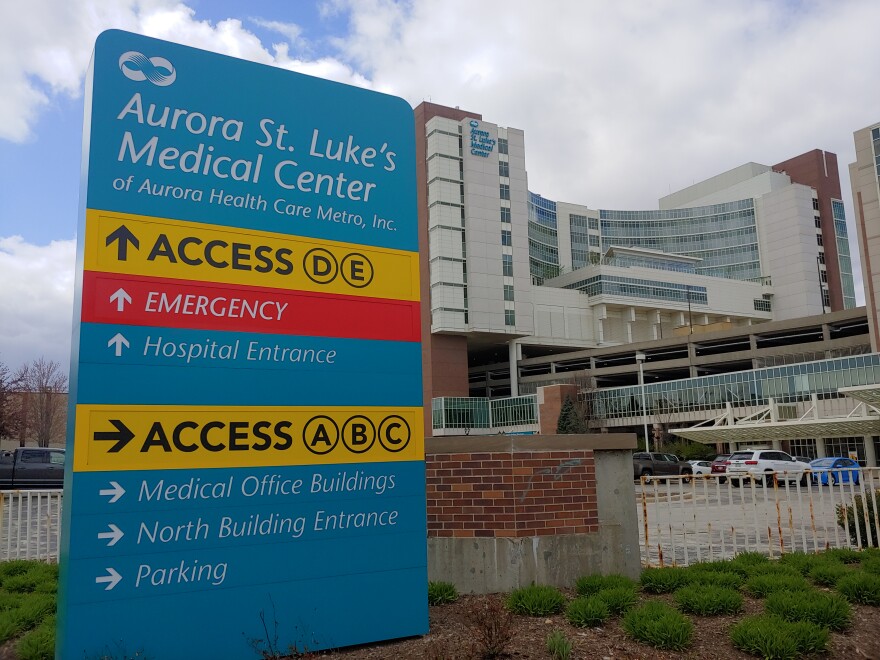A drug that could help speed the recovery of some COVID-19 patients by several days is now being given to a person in Wisconsin. The trial use of remdesivir is taking place at Froedtert Hospital in Wauwatosa.
Two weeks ago, National Institute of Allergy and Infectious Diseases Director Dr. Anthony Fauci told a White House event that preliminary data from a drug trial showed remdesivir has a clear-cut, significant, positive effect in diminishing the time to recovery.
Stat reports that manufacturer Gilead Sciences has since distributed the drug to about two dozen U.S. hospitals for additional trials. Froedtert is the only hospital in Wisconsin, according to Dr. Mary Beth Graham, the medical director of infection prevention and control at Froedtert and a professor of medicine at the Medical College of Wisconsin.
>>Latest WUWM & NPR Coronavirus Coverage
Graham says remdesivir blocks the coronavirus from replicating.
"This drug works directly on the virus, and messes up what's called a polymerase — basically messes up an enzyme inside the virus that is required for the virus to make more of itself. If the virus can't make more of itself, then you can't have more virus going into more cells and causing more damage," Graham told WUWM.

Graham says federal law prevents the hospital from saying much about the patient receiving remdesivir. But Graham says under rules set out by Gilead under a so-called expanded access program, or EAP, the patient has to be in intensive care and breathing through a tube inserted into the mouth or the windpipe.
"And then there are exclusion criteria. They can't have [kidney] failure. They can't have multi-system organ failure. They can't be on multiple medications to help support their blood pressure."
Remdesivir will be given to the Froedtert patient through an IV for 10 days.
The use with COVID-19 patients gets underway as a national controversy is brewing over whether remdesivir should be distributed more widely. Graham says Froedtert got in through tenacity and luck.
"I applied to every single clinical trial that was out there, that Gilead had. I emailed multiple times trying to get into the multiple clinical trials. Then, when the EAP became available, it was around two-and-a-half to three weeks of constant emails,” Graham said.
But national groups representing infectious disease and HIV doctors and scientists wrote Vice President Mike Pence this week. The letter said that under the FDA's emergency use authorization of remdesivir granted this month, there needs to be fair and equitable distribution of the drug.
>>Putting A Price On COVID-19 Treatment Remdesivir
Dr. Michael Carome directs health research for the watchdog group Public Citizen. He says any patient in the U.S. who meets the conditions for the drug should have an equal opportunity to receive it.
"Concerns have been raised that the federal government has taken control of the distribution of remdesivir. And I think there's reason for serious concerns about that, given how poorly the federal government has performed distributing medical supplies throughout this pandemic catastrophe," Carome said.
Federal agencies like the Federal Emergency Management Agency, the Food and Drug Administration, and the Department of Health and Human Services have said little about the distribution issue.

AdvocateAurora, which operates hospitals and clinics in the Milwaukee area, says it's working to procure remdesivir for some of its most severely ill patients. But the company says “supplies are limited and difficult to access at this time.”
Public Citizen policy researcher Zain Rizvi says if remdesivir winds up speeding the recovery of many COVID-19 patients, there will be an issue of economic fairness to consider. Rizvi says federal agencies have already spent more than $70 million subsidizing development and refinement of the drug. So, Rizvi says patients should not have to pay more than a dollar a day.
"We know that the cost of production of remdesivir, even with a reasonable profit, is below that margin. Given the substantial role of the taxpayer in developing remdesivir, Gilead should either price it at one dollar a day or start disclosing immediately, exactly what it has spent developing that drug. We need that transparency," Rizvi said.
The Infectious Diseases Society of America wants full data released on the completed clinical trial that put remdesivir in the spotlight.
Have a question you'd like WUWM to answer? Submit your query below.
_






